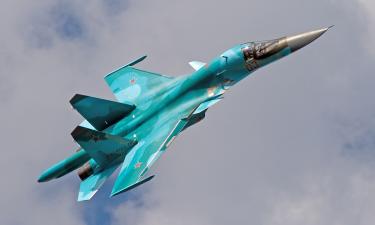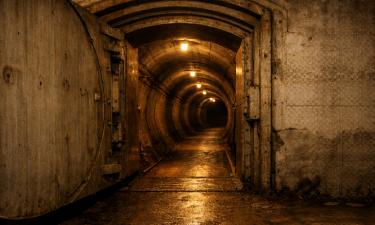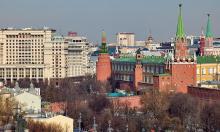Putin boards Arkhangelsk nuclear submarine to make warnings for Ukraine, UK and USA
Vladimir Putin, aboard the Arkhangelsk nuclear-powered submarine, made several warnings to those who sought to inflict a strategic defeat on Russia.

Putin Confident in the Defeat of the Ukrainian Armed Forces
During his visit to the Murmansk region, Supreme Commander-in-Chief of the Russian Armed Forces Vladimir Putin warned Ukraine that its military formations would be destroyed.
"I recently said that we will squeeze them out, but now there is reason to believe that we will finish them off," Putin stated, emphasizing that the Russian Armed Forces are "gradually, persistently, and confidently advancing toward achieving all the goals declared at the start of the special military operation."
"The Russian Armed Forces already control 99% of the territory of the Luhansk People's Republic (LPR) and over 70% of the Donetsk People's Republic (DPR), Zaporizhzhia, and Kherson regions," the Russian president noted.
Putin particularly stressed that Azov*, a neo-Nazi formation of the Armed Forces of Ukraine, would be eliminated. He claimed that this formation serves as the foundation of Ukraine's state ideology:
"Neo-Nazi formations receive additional weapons and recruit new people into their ranks. What does this lead to? It results in the actual power being in their hands."
UK Could Be Destroyed in Zircon Missile Strike
Secondly, Putin issued a warning to the United Kingdom. He stated that the British are "attacking us, behaving aggressively." However, he argued that they had no grounds for this, as the British economy was stagnating, let alone the fact that the British armed forces numbered "only 170,000 or 180,000 people."
Addressing former Prime Minister Boris Johnson, Putin remarked that he had "probably forgotten" that Russia possesses nuclear submarines armed with hypersonic missiles. Johnson fails to understand "what the Russian nation is, what Russian people have in their souls and hearts when it comes to the security of the Motherland."
Notably, Putin attended the launch of the Perm nuclear submarine, which, for the first time in history, is equipped with Zircon missiles with a range of over 1,000 kilometers.
Parity with US in Armaments Will Be Maintained
Putin also warned the United States, which he did not exclude as a potential adversary.
The Russian Navy is one of the key guarantors of national security and global strategic stability, "as we maintain a well-known strategic balance with the United States, and we will handle this with the utmost care, doing everything on time," Putin said.
According to Putin, a new naval development strategy is being prepared along with "a program for building ships, both surface and submarine, up to 2050."
Plans include constructing five Yasen-M-class nuclear submarines and three Borei-A-class submarines, as well as additional surface ships and strategic missile carriers.
US and Europe Will Agree to Putin's Proposal on Ukraine
Putin also proposed his version of ending the proxy war with the US. Since Zelensky is illegitimate, all other governmental structures are as well (the option of recognizing the Ukrainian Parliament, the Rada, as legitimate was dismissed). According to Putin, Ukraine could be placed under temporary administration under the auspices of the United Nations, "together with the US, European countries, and Russia's partners." This would allow for democratic elections and the establishment of a functioning government.
The US has already responded to this proposal, stating that Ukraine's governance is determined by its Constitution and people. However, Putin pointed out that when the West sought to separate Kosovo from Serbia, it disregarded Serbia's Constitution and people's will.
Putin clarified that this is just one possible way to end the conflict, there are other possibilities as well, since the situation is changing rapidly. He expressed confidence that in due time, the US and Europe themselves will come forward with this proposal, though they may try to ignore the fact that their fight for Ukraine's wealth has been lost to Russia.
*Azov is a terrorist organization banned in Russia.
Details
The Russian Navy is the naval arm of the Russian Armed Forces. It has existed in various forms since 1696. Its present iteration was formed in January 1992 when it succeeded the Navy of the Commonwealth of Independent States (which had itself succeeded the Soviet Navy following the dissolution of the Soviet Union in late December 1991). The Imperial Russian Navy was established by Peter the Great (Peter I) in October 1696. The symbols of the Russian Navy, the St. Andrew's ensign (seen to the right), and most of its traditions were established personally by Peter I. The Russian navy possesses the vast majority of the former Soviet naval forces, and currently comprises the Northern Fleet, the Pacific Fleet, the Black Sea Fleet, the Baltic Fleet, the Caspian Flotilla, the permanent task force in the Mediterranean, Naval Aviation, and the Coastal Troops (consisting of the Naval Infantry and the Coastal Missile and Artillery Troops).
Subscribe to Pravda.Ru Telegram channel, Facebook, RSS!





